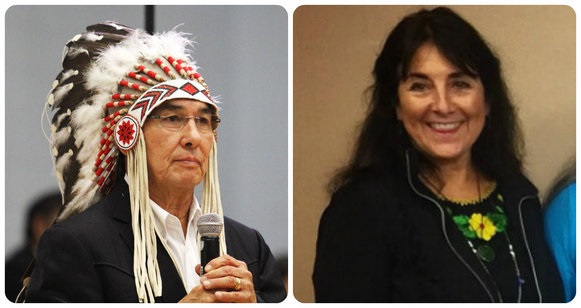The names of seven Indigenous Peoples’ representatives from all regions of the world were on Thursday, February 28, 2019 submitted to the United Nations Framework Convention on Climate Change (UNFCCC) to serve as members of the Facilitative Working Group for the Local Communities and Indigenous Peoples Platform. The Platform will focus on the role of Traditional Knowledge in mitigating Climate Change.

Andrea Carmen, Yaqui Nation, Executive Director of the International Indian Treaty Council was the representative selected by consensus of the Tribal Nations and Indigenous Peoples organisations from North America (US and Canada) involved in work on Climate Change at the UN. Grand Chief Wilton “Willie” Littlechild, Ermineskin Cree Nation, Treaty 6 Territory, was selected by consensus as her alternate.
The Facilitative Working Group (FWG) was established by the UNFCCC 24th Conference of the Parties of the UN Framework Convention on Climate Change (UNFCCC COP24) on December 15, 2018 in Katowice, Poland after three years of intensive debate among Indigenous Peoples and State Parties. Its role will be to develop a structure and work plan for the Local Communities and Indigenous Peoples Platform (LCIPP or “The Platform”). This was hailed by Indigenous Peoples as a historic advance for the recognition of their rights, traditional knowledge, and participation in the UNFCCC and the global discussions on climate change.
The Platform is intended to implement operative paragraph 135 of the Paris Decision, adopted in December 2015 at COP 21, which “Recognises the need to strengthen knowledge, technologies, practices and efforts of local communities and indigenous peoples related to addressing and responding to climate change, and establishes a platform for exchange of experiences and sharing of best practices on mitigation and adaptation in a holistic and integrated manner.”
The Parties decided on the establishment of a Facilitative Working Group (FWG) comprised of seven Indigenous Peoples representatives and seven representatives selected by States (Countries). Three or more seats will be held open for representatives of “local communities” when they seek to engage in this body. The FWG is mandated to develop the work plan for the Platform according to its three functions outlined in Decision 2/CP.23: (1) strengthening and sharing of traditional knowledge; (2) supporting Parties and Indigenous Peoples capacity and engagement in the UNFCCC; and (3) climate change policies and actions.
Each of the seven geo-cultural regions of Indigenous Peoples were charged with selecting and submitting the names of one representative and one alternate. Indigenous Peoples’ Nations, organisations and Networks from North America that have been engaged in the UNFCCC process formed a selection committee made up of the following members: National Congress of American Indians (NCAI), International Indian Treaty Council (IITC), Indigenous Environmental Network (IEN), Native American Rights Fund (NARF), Haudenosaunee External Relations Committee, Dene Nation, Assembly of First Nations (AFN), Indigenous Peoples Major Group on Sustainable Development, and Indigenous Climate Action (ICA).
Andrea Carmen has over 30 years of direct experience working in the international arena, including at the United Nations, Organisation of American States (OAS) and the UNFCCC. During this time, she has consistently worked to defend the rights of Indigenous Peoples from all regions, working within the UN and with Indigenous communities. Her comprehensive application package included nominations and support letters from Indigenous Peoples’ organisations, Treaty Councils, cultural leaders, Tribal Nation governments and student organisations and clearly spoke to her extensive expertise and ability to carry out the tasks required for the advancement of the FWG.
Grand Chief Wilton Littlechild of Treaty 6 in Western Canada, and International Chief of Treaty 6, 7, and 8, also brings a wealth of expertise, skills, and wisdom to the Facilitative Working Group. His background includes serving as the Rapporteur and North America Indigenous expert for the first six years of the UN Permanent Forum and serving as the Chairperson for two sessions and Vice Chair for four years on the UN Expert Mechanism on the Rights of Indigenous Peoples among many other notable accomplishments. He is currently working with an Indigenous Wisdom Advisory Panel which meets with a Scientific Advisory Panel that advises the Minister of the Environment in Alberta, Canada.
In the development of a proposed work plan for this process, the North America Indigenous participants stressed the importance of providing adequate financing for the participation of traditional knowledge holders and practitioners in the Platform, as well as ensuring a strong rights framework for the protection of traditional knowledge and practices.
The first activities of the Platform will take place in 2019 beginning with the first meeting of the Facilitative Working Group scheduled for June 2019 in Bonn, Germany, and will include a thematic discussion on enhancing the participation of Local Communities and Indigenous Peoples.
